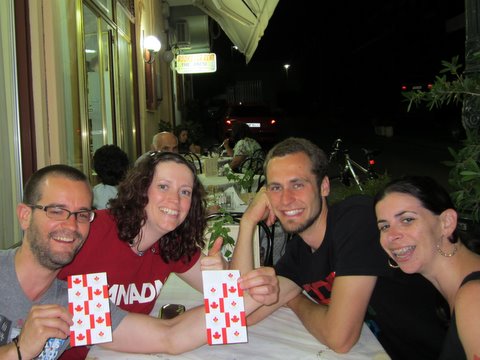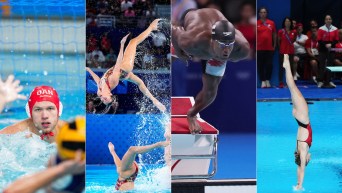Jackie's IOA Journal: Something to Talk About
Here at the International Olympic Academy there is a pretty full schedule of activities every day. A typical day looks like this:
7:00am – morning exercises – usually lessons on a sport you don’t know about like Headis (look it up on YouTube!)
7:30am – breakfast
8:30am – lectures – usually lasts until 11:30am or 12:00pm
1:00pm – lunch
2:00pm – concurrent dance and arts workshops
4:30pm – discussion group session
6:00pm – sports (I’m on a basketball team, but there’s volleyball and soccer too)
8:00pm – dinner
9:00pm – a planned social activity
The only activities that are truly mandatory are the lectures and the discussion groups. Everything else is optional, but fortunately most people try to do all of the activities so that they maximize their experience. This includes the ‘unscheduled’ visits that seem to happen every night around 10 or 11pm to the town of Olympia, about 1.5km from the IOA campus, to a place called Zorba’s. There have been a few special events too, like the hike to the top of Mount Kronion yesterday morning at 5am to watch the sunrise or the torch relay, with a torch from the 1968 Olympic Games in Mexico, yesterday afternoon.
Throughout all of this there are many opportunities for informal social interaction. This is the time when I get to learn the most about the other delegates, find out their opinions on a wide variety of topics, or learn about various cultural differences. For instance, I’ve learned that throughout most of Europe there isn’t much recycling available in public areas or venues. Many people recycle at home, but on the streets, in hotels or shopping areas there are no recycling bins.
There is a lot of exchange during discussion groups too. My discussion group sessions have covered some really wide topics and there are lots of varied opinions. We have had seven discussion group sessions so far, each one lasting about 90 minutes. In our group there are people from Armenia, Austria, Canada, Chinese Taipei, Colombia, Croatia, Czech Republic, India, Korea, Norway, Peru, Poland, Spain, and Tajikistan. Some of the topics we’ve discussed so far are the purpose of the Olympic Movement, how each of us plans to promote Olympism in our countries, what can be done to help us be better ambassadors for Olympism and what we think about the different sports and disciplines that are currently included in the Olympic program.
The discussion got interesting in a hurry when one member of the group informed us that he didn’t believe women should be permitted to participate in boxing or wrestling as it involves a lot of hitting and that was against social morals & values for women. When I asked why it was ok for women to play ice hockey, which also has a lot of contact, he indicated that it was different because the men are allowed body contact in their game and the women are not. I asked him why basketball was different since the rules are the same for both genders and there is a lot of contact in that sport, but he didn’t have a comment on that. There were a few group members on both sides of the argument.
The nice thing about the IOA is that we can have that discussion, passionately, without causing offence or anger. I vehemently disagree with his opinion, but we can still have dinner in the cafeteria together afterwards.
I think that is really what Olympism, the Olympic Values, and the entire Olympic Movement is trying to be: a tool for education that brings people together in a safe and peaceful environment to allow for things from passionate disagreements about women in boxing to delegations like North and South Korea putting aside their political differences to walk in an Opening Ceremonies of the 2000 Olympic Games in Sydney together under one flag, to the concept of the Olympic Truce allowing the warring countries of Afghanistan and Iraq to participate in the same 2004 Olympic Games in Athens.
Canada is considered a leading nation in Olympic education here and I hope I can contribute to that legacy and help more people to see that the Olympic Gamess are not just about higher – stronger – faster, but also about fun, fairness, respect, personal growth, leadership and peace.




